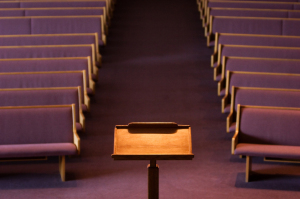SBC Guys Eyeing the 'Mac'
Southern Baptists are at a crossroads, says one prominent leader, and the path they choose to take next could lead to either growth or death.
Pondering the future of the Southern Baptist Convention and its identity in the 21st century, Dr. R. Albert Mohler Jr., president of The Southern Baptist Theological Seminary in Louisville, Ky., delivered a wake-up call to a denomination that had once been the General Motors of church groups but may now be on its way to bankruptcy.
"If the SBC is indeed in some way analogous to General Motors, the warning is we can find ourselves – if we are trapped in the organizational logic of the 1950s, the 1960s, and the 1970s – in a similar crisis," Mohler said in an address Wednesday to seminary students, faculty and staff.
General Motors had previously led in global sales for nearly eight decades. But the U.S. automaker lost that crown in 2008 to Toyota and later filed one of the largest bankruptcies in U.S. history.
What worked for GM just a few decades ago clearly wasn't working for them in the 21st century and the company's future is anything but certain, Mohler said, as he drew an analogy.
The Southern Baptist Convention is the largest Protestant denomination in the country with 16.2 million members. But recent statistics revealed a drop in membership for the first time in decades and declining baptisms. And if the current trends continue, membership will fall nearly 50 percent by 2050. The reports have prompted many leaders to call for change.
"We're going to have to go back and say 'it may have made sense to be General Motors at one point ... but that world has passed,'" Mohler said. "General Motors is bankrupt."
A corporate mentality began developing in the SBC in the 1920s when the denomination established an executive committee, Mohler explained. The committee's powers were expanded and they eventually moved into a newly established headquarters. In the 1950s the SBC employed the services of a management consulting firm to help the denomination accomplish its mission more efficiently.
Although Southern Baptists experienced growth and at that time understood such methods as the best way to accomplish the Great Commission purpose, the question now is whether that corporate mentality is the rightful structure and ethos for today and the future, the SBTS president said.
In his opinion, it is not.
"We got to figure out how to be relevant to the purposes of God and the first thing we need to do is go to the Scriptures and find a theological rational. The last thing we need to do is, first of all, bring in the management experts to tell us again how American business culture is adopting to this new age," Mohler stressed.
It is not irrelevant to learn from such experts, he noted, but "the logic of the SBC cannot be bureaucratic, certainly cannot be corporate, and cannot be drawn from business."
"Southern Baptists are going to have to decide ... whether or not we're going to move into the future with all of these questions of structure and method open.
"This is going to require a rethinking of the entire logic of the SBC."
Some of the other critical questions Mohler posed to the SBC include whether the denomination will be missional or methodological, more strategic or more anemic, young or dead, and bold or boring.
"This is a time and this is a generation that is not going to be satisfied with boring," he said. "The mission of the Lord Jesus Christ is so bold that it can never be boring. We're going to have to take risks. And that's tough ... especially for an organization feeling the pangs of transition."
Southern Baptists have to also decide whether they're going to be happy or bitter in the future.
"We have taken on the reputation for denominational crankiness. We appear upset, angry and frustrated," Mohler lamented. "We cannot afford to waste the opportunities to reach our neighbors by being cranky about things that are irrelevant and unhelpful and extraneous to the SBC.
"If we're a denomination of unhappy cranks, we will decline and disappear and deserve to do so."
To sum it up, Mohler referenced the famous PC versus Mac ads.
The SBC is primarily made up of PC guys, he explained. "We grew up that way ... that worked for a long time. And then we keep looking at the Apple guy, who's more focused on the future."
"The actual logic of those ads is that they simply don't think alike ... The logic isn't the same," he pointed out. "There is a discernible difference that everyone almost immediately recognizes when you see that ad."
"Southern Baptists cannot be seen as backward and cranky, as committed to the wrong kind of cultural identification and trapped within that kind of isolation. We're going to have to be missional, directed outward, uncranky, visionary, oriented to the future, happy and joyful, and claiming and assuming the responsibility that Christ has invested in us and being faithful to that."



























